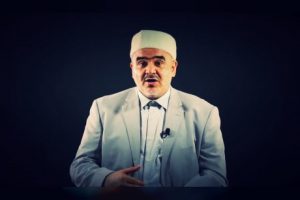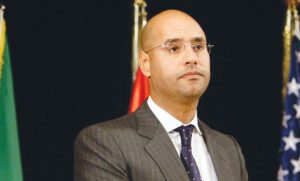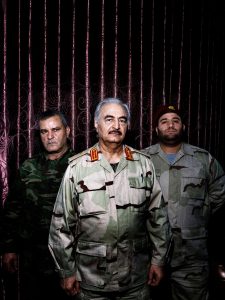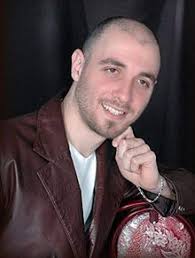Abdelhakim Belhadj
Huda Ben Amer
Hisham Ben Ghalbon
Mohamed Ben Ghalbon
Salwa Fawzi El-Deghali
Muammar Gaddafi
Seif al-Islam Gaddafi
Born in June of 1972, Seif al-Islam Gaddafi, is the most prominent of former Libyan Dictator, Muammar Gaddafi. Gaddafi has a PhD from the London School of Economics in 2008; his dissertation discussed the role of civil society in reforming global governance. Seif al-Islam returned to Libya, where behind his father, Seif al-Islam became perhaps of the most influential men in Libya. He was also part of his father’s inner circle. Seif al-Islam is a well educated man, and during the Gaddafi regime he used his excellent debate and negotiation skills for international and public relations. He was instrumental in negotiations in Libya that led to the abandonment of weapons of mass destruction. This was in congruence with with the West’s war on terror which Seif al-Islam also supported. In Libya, Seif al-Islam was president of the Gaddafi International Foundation for Charity Associations. It was also through Seif’s human rights organization, that both Amnesty International and Human Rights Watch where allowed to enter Libya in 2009. Both organizations observed the repressive atmosphere but felt there was improvement in Libya largely due to efforts made so far by Gaddafi in the arena of human rights. In late 2009, however, Seif changed his tune. He began voicing his frustration with the US; he stated the abandonment of, and campaign against weapons of mass destruction and terrorism, was dependent on US compensation. At the start of the civil war in 2011, Seif made a statement denying the allegations that the government had launched airstrikes against Libyan cities and stated that the number of protesters killed had been exaggerated. He continued to deny the killing of civilians being carried out by his father’s regime. Many allegations began surfacing against Seif claiming that both he, and his father were ordering the killing of civilian protestors. In June of 2011, the International Criminal Court issues an arrest warrant of Seif al-Islam Gaddafi on multiple counts of human rights abuses and crimes against humanity. In August, he left Tripoli after it fell to rebel forces. After the death of his father and brother, Seif is televised stating “I am in Libya, I am alive and free and willing to fight to the end and take revenge.” Later, Seif tried to flee to Niger but was captured on November 19, 2011 by rebels. He was thrown in prison in Zintan before he was given a death sentence. However, Seif was never killed and was freed when Libyan militia evoked the amnesty law. Backed by many major tribes in Libya, there are rumors that Gaddafi may to run for President in the 2018 elections.
(Written by Marisa Edmondson)
http://www.aljazeera.com/indepth/features/2017/06/saif-al-islam-gaddafi-170611100447331.html
http://military.wikia.com/wiki/Saif_al-Islam_Gaddafi
http://www.bbc.com/news/world-africa-40246964
Khalifa Haftar
Khalifa Haftar was born in Ajdabiya, Libya in 1943. His political career began in 1969 when he participated in Qaddafi’s coup against Libyan monarchy. He was one of Gaddafi’s top officers and as king, Gaddafi put Haftar in charge of the Libyan forces opporating in the French, Chad conflict. In 1987 Libya was defeated and Haftar, along with his men, were captured. Gaddafi publically denied association to Haftar, abandoning him and his men.
In 1988 Haftar aligned with an opposition group in Chad supported by the CIA known as the National Front for the Salvation of Libya. He was released from prison and given US citizenship. Haftar spent approximately 20 years in Virginia where he alinged with the CIA and the Salvation Front to end Qaddafis rule.
During the uprising against Gaddafi In 2011, Haftar returned to Libya to become the commander of a rebel force. After the uprising Benghazi and much of the eastern region was under the power of Islamist groups such as al-Qaeda and Ansar al-Sharia. In 2014 Haftar appeared on TV to broadcast his plan to bring peace and stability to the nation. He called for an uprising against the elected parliament and the GNC and proposed Operation Dignity: a moveemnt aagainst islamist militants in Benghazie and the east. In March 2015, the parliament elected by the House of Representatives appointed Haftar commander of the Libyan National Army.
In February of 2016 the Libyan National Army claimed to have removed islamist militants from Benghazi and the nearby region and in 2016 he used the LNA to seize key oil terminals from the Petroleum Facilities Guard (an armed group under the UN organized Government of National Accord). While Haftar has refused to accept the legitimacy of the Government of National Accord and has been accused of war crimes, his political presense in Libya has increased in recent years.
(Written by Sabrina Quintanilla)
http://www.bbc.com/news/world-africa-27492354
http://mediterraneanaffairs.com/libya-who-is-general-khalifa-haftar/
https://www.newyorker.com/magazine/2015/02/23/unravelling
Mahmoud Soleiman al-Maghrebi
Baghdadi Ali al-Mahmoudi
Ali Sallabi:
Ali Sallabi is a religious scholar and Islamist politician who was born in Benghazi in 1963. He is known as a scholar in the Muslim World for his many publish ed works on the early history of Islam. At an early age, he joined the Muslim Brotherhood. After being charged for anti-Gaddafi activity, he spent eight years in Gaddafi’s horrific prison in Tripoli. Following his release, he attended the Islamic University of Medina where he graduated with a bachelors degree and continued to earn a masters and doctorate before settling in exile in Qatar. Ironically, he became involved with Gaddafi’s son, Said al-Islam, as they worked together on a successful mission to release Islamist prisoners form Libyan prisons. During the 2011 revolution he returned to Libya. He maintained a strong but controversial relationship with the Qatar ruling family, and was chosen to distribute 2 billion in aid to the Libyan rebels from Qatar. He was also closely associated with the February 17th Martyrs Brigade which is an Islamist militia run by his brother, Ismail al-Sallabi.
ed works on the early history of Islam. At an early age, he joined the Muslim Brotherhood. After being charged for anti-Gaddafi activity, he spent eight years in Gaddafi’s horrific prison in Tripoli. Following his release, he attended the Islamic University of Medina where he graduated with a bachelors degree and continued to earn a masters and doctorate before settling in exile in Qatar. Ironically, he became involved with Gaddafi’s son, Said al-Islam, as they worked together on a successful mission to release Islamist prisoners form Libyan prisons. During the 2011 revolution he returned to Libya. He maintained a strong but controversial relationship with the Qatar ruling family, and was chosen to distribute 2 billion in aid to the Libyan rebels from Qatar. He was also closely associated with the February 17th Martyrs Brigade which is an Islamist militia run by his brother, Ismail al-Sallabi.
After Gaddafi was overthrown Sallabi was at the forefront of the opposition and accused the interim Prime Minister and leader of the NTC of being extremely secularist and wanting to impose another totalitarian government. Sallabi then announced the formation of the National Gathering for Freedom Justice and Development Party, later known as al-Watan, which would take part in the election. Their main platform was to establish a new constitution based on Sharia law. However, it won no seats in the 2012 congress election as secular opponents saw Sallabi as a puppet to Turkey and Qatar. Following the 2017 Qatar diplomatic crisis, which involved Qatar support for the Muslim Brotherhood, Sallabi was placed under the terrorist watch list and issued a travel ban by multiple Arab nations as he was considered the ideological brains of the Muslim Brotherhood.
(Written by Hanna Mass)
http://acdemocracy.org/libya-ali-al-salabi-and-the-re-emerging-muslim-brotherhood/
Fayez Sarraj
General People’s Congress
National Transitional Council
National Liberation Army
Mohammed Nabbous
Mohammed Nabbous was a prominent journalist who was active during the time of the Libyan revolution. He was particularly active in Benghazi, where he set up his LiveStream news channel known as Libya al-Hurra. He was forced to move every few hours in order to evade detection and capture. His news channel was the first independent, non-state sponsored news outlet, and was aimed at countering state propaganda and fake news broadcast by the Gaddafi regime. His broadcasts allowed for the outside world to access images within Libya, and his images were rebroadcast on larger stations like AL Jazeera. Nabbous became known as the voice of the revolution, as he interviewed protesters, and even broadcast information provided by informal contractors from all across the country. He was also one of the first Libyans that western media chose to interview, following the takeover of Benghazi by rebel forces.
On 19th March 2011, Nabbous went out in Benghazi to capture footage of the carnage left behind by bombs dropped by the Libyan air force on Benghazi, in defiance to the no-fly zone voted on by the UN Security Council. While on this endeavor, he was shot in the head by a sniper and despite being rushed to the hospital, succumbed to his injuries. His death prompted a reaction across much of Western media, as well as in Libya where a quote from his original video I am not afraid to die; I am afraid to lose the battle.” was circulated. Since his death, Nabbous has been compared to figures such as Patrick Henry, for his role in the achievement of Libyan liberty.
(Text by Akhila Roy Chowdhury)
https://www.cato.org/blog/patrick-henry-mohammed-nabbous
Muammar Gaddafi
In 1942, Muammar Gaddafi was born in a Bedouin tent in the rural Libya. 27 years late, Gaddafi led a bloodless military coup and took control over the nation. From 1969 to 2011, more than 40 years, Gaddafi served as the sole authoritarian power. Given the discovery of natural resources, Gaddafi ushered in a degree of prosperity and wealth in the country that had not been seen before. This wealth peaked around 1980, after which, many scholars consider that Gaddafi ran his country to ground. Ultimately ending in his ousting and killing in the streets of his tribal hometown of Sirte.
Gaddafi was an admirer of Egyptian leader Gamal Abdel Nasser and his Arab socialist and nationalist ideology. He developed his own political ideology transcribed in the green book. His ideology was known as the third international theory, and this was partly inspired by Islamic Socialism, Arab nationalism, African nationalism and partly by the principles of direct democracy. He then transformed his state into the Jamiyahh in 1978. Strong Arab and African unity was based in a shared anti-western/colonial sentiment. Gaddafi insisted that Islamic law should be the basis for the law of the state, blurring any distinction between the religious and secular realm. His government implemented social reforms, with sharia as basis, a ban of alcohol and nightclubs, while established social welfare programs. Government combatted strict social restriction imposed on women by previous regime, established equal pay and revolutionary women’s formation to encourage reform. Passed equality in pay law in 1970 — encouraged women to take roles in military. Since his death, the country has lacked a united government and strong leadership. As a result, Libya has been suffering the consequences of fragmentation, to the extent that organizations such as ISIS have established strongholds in the region.
(text by Raouf Belkhir)
http://www.bbc.com/news/world-africa-12688033
http://www.aljazeera.com/indepth/2011/02/201122117565923629.html
https://www.biography.com/people/muammar-al-qaddafi-39014


